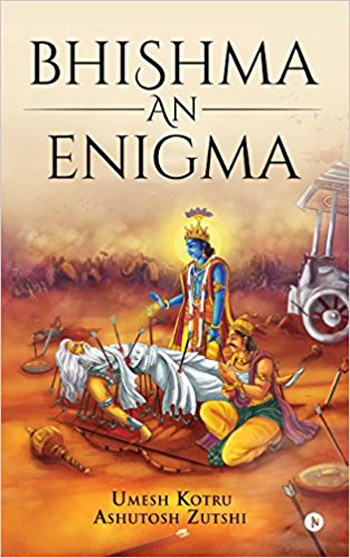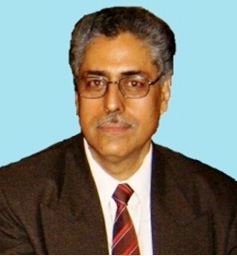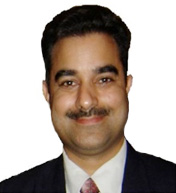Bhishma an Engima

|
| BOOKS & PUBLICATIONS |
| Authors: Umesh Kotru, Ashutosh Zutshi |

|
| |
| Authors: Umesh Kotru, Ashutosh Zutshi Publisher: Notion Press ISBN: 13-9781948352413 Binding: Hardbound |
| |
| Synopsis |
| |
| Bhishma or Devavrata happens to be one of the most enigmatic and complex characters of the great epic Mahabharata. Bhishma is considered to be an incarnation of the chief among the eight demigods known as Vasus or the gods of natural elements. He takes birth as a human on account of a curse placed upon the Vasus by Maharishi Vashistha. While seven of them get liberated immediately after birth as a result of curtailment of his own curse by Maharishi Vashistha, the eighth one who went on to be known as Bhishma had to live for a very long time. His lifespan actually lasted for five generations virtually covering all the major events described in the epic. In fact almost entire ‘Jaya’ the core of Mahabharata actually revolves around Bhishma. His importance can be gauged from the presence of a galaxy of other strong characters like Sri Krishna, Dronacharya, Vidura, Yudhishthira, Bhīma, Arjuna, Duryodhana, Karna, Shalya, and Ashwathama among many others. Like Bhishma one other character that plays a pivotal role besides being the author of the epic happens to be Krishnadvaipayana also known as Maharishi Vedvyasa. As the title suggests, ‘Bhishma an Enigma’ deals with the dualistic nature of the character of Bhishma. While his stature as a fearsome warrior is vividly brought out he is also portrayed as an eminent personality of highest learning and knowledge that he possessed. The book also brings out Bhishma’s inner as well as outer turmoil which he wrestled with right till the very end. Although he ruled as a regent for a long time yet we don’t know how he would have fared as an actual king for generations on account of his having control over death as a result of his father’s boon. Although his story would have been quite different but, surely, it would not have been as captivating as it actually turned out with innumerable twists and turns The varied emotions and characteristics of Bhishma, like self-pity, inertia, sacrifices, adherence to his principles among many others are lucidly captured in the book. The book is presented in the flashbacks format through various musings and reveries which Bhishma went through while lying on the bed of arrows. In this endeavour his remaining inactive on the bed of arrows for fifty eight days simplified the task of reviewing his life prior to the actual war of Mahabharata. In essence the book attempts to highlight the tall stature of the character of Bhishma despite his seemingly occasional lapses. His greatness is further emphasised when he did not try to defend himself when his mother Ganga, Krishna and Vedvyasa allude to his shortcomings which point to his projection as a mixture of opposites. Devavrata was the eighth son of Shantanu, the emperor of Hastinapura and Ganga. Immediately after his birth, Ganga went away taking him along since Shantanu had broken his agreement with Ganga. Devavrata therefore spent his entire childhood with his mother and knew nothing about his father. He was tutored by the best of Rishis of the time in various fields which included knowledge of Scriptures, Political Science and Science of Warfare. He became a formidable warrior whom nobody could face in a war and was held in awe by everyone on this count. He also became renowned for his overall knowledge. He was accidently discovered by his father when he reached boyhood. After getting re-united with his father his mother deserted him. Thus Devavrata did not have a normal childhood. He was brought up by his mother and handed over to his father after attaining boyhood. In due course he was conferred the title of the crown prince of Hastinapura by his father Shantanu formalizing his right of succession to the throne. After lapse of sometime everybody noticed that Shantanu had become despondent and started behaving indifferently towards everyone including his son. Upon enquiring through his own sources about the cause of his father’s despondency Devavrata learnt that his father had fallen in love with a fisherwoman named Satyavati (Matsyagandha) but could not marry her on account of an unacceptable condition proposed by her father. He immediately approached the father of the girl and got first-hand information about the whole episode. The condition put forward by the fisherman was that Shantanu could marry Satyavati only if the right to succession of the throne of Hastinapura was vested in the children born through Satyavati and, in turn, to their progeny. Without any hesitation Devavrata vowed that he would relinquish his right to succession of the throne of Hastinapura. In response to another query from the father of the girl as to how he could ensure that the claim to the throne would not be staked by his children and their progeny, Devavrata took another vow. He declared that he would remain unmarried throughout his life and spend a life of celibacy. This satisfied Satyavati’s father and he consented to her marriage with Shantanu. On account of having taken such difficult vows Devavrata got a new identity of Bhishma which stuck with him throughout his life. By way of appreciation and gratitude he also received a boon of control over his death from his father Shantanu. He could choose the time of his death on account of this boon. These developments had a profound impact on the course of events that followed. In order to ensure that his vows did not get broken he had to pledge himself to protect the throne of Hastinapura and its occupant, whosoever it was. He had to reiterate his vows and renew his pledge on many occasions. Careful scrutiny of the events that took place leads one to conclude that his every action and sometimes inaction was dictated by his priority to protect the vows he had taken. He was faced with numerous challenges and difficult situations. But every time he decided to act with the intention of keeping his vows intact. His fear of being held untruthful towards his vows ultimately led to the downfall of the Kuru race. He chose to ignore various deplorable actions of Duryodhana; like attempting to harm or even kill Pandavas, public misbehaviour with Draupadi, deceitfully robbing the Pandavas of their kingdom and banishing them to the forest to name a few. He could have easily banished Shakuni from Hastinapura after his role in fostering enmity between Kauravas and Pandavas became clear. As a result he actually contributed towards the destruction of the very edifice which he himself had sworn to protect. As a grandsire and the eldest Kuru, the onus of setting the house in order lay with him. It is ironic that even though Bhishma relinquished his right to rule Hastinapura, he actually had to officiate as the Regent of Hastinapura for a major part of his life right from the time of Shantanu’s demise. In fact Hastinapura never had a proper king after the death of his father for any decent period of time. When Shantanu died, both the sons of Satyavati were small kids. After attaining the age to rule the kingdom, both of them died in quick succession after occupying the throne for a brief period. Pandu could not rule for long and Dritrashtra was blind. Therefore Bhishma was actually in charge of running the affairs of the kingdom virtually throughout the period after the death of his father. An occasion also arose when no heir to the throne except Bhishma was left. Even then he struck to his vows and instead took another vow to stand by the throne of Hastinapura and its occupant under any circumstances. Therefore he went on binding himself with a string of pledges which proved very costly in the end. While it is easy to lay blame on Bhishma for what eventually transpired, we should not ignore his dilemma and inner turmoil that he must have faced. He had to work hard till the very end and had to participate in the most destructive war despite his advanced age. He was a witness to the near complete annihilation of the Kuru race before he finally closed his eyes for the last time. His last days were spent on a bed of arrows which would have been very painful and perhaps, as he believed, provided a means of expiating his sins. We are therefore inclined to conclude that the character of Bhishma was dualistic and not free from contradictions. On one hand he was a very knowledgeable and righteous person, while on the other he contributed to evil with his inaction or inappropriate action. One of the plausible explanations that can be assigned to the way he chose to act could be the facade of ego which every human builds around himself. The ego can be either righteous or evil. While the ego of a righteous person makes him act in a manner which leads to self-sacrifice, the ego of an evil person works to make him harm others. In either case both of them act to satisfy and feed their individual egos. The Mahabharata is full of such examples. For instance Karna comes closest to Bhishma in this respect. This book also attempts to lay bare in front of the readers the puzzle associated with the character of Bhishma and analyse its impact on the way events contained in the epic unfolded. The Strong influence of one’s nature on one’s behaviour comes out vividly in the character of Bhishma. Despite being told about his status of a demi-god and being advised by his mother Ganga and learned men like Vidura, he stuck to his cherished principles. He acted as a true Kshatriya and his traits have come down over ages to medieval times when men like Maharana Pratap and Prithviraj Chauhan among others died for the Kshatriya dharma. Had any of them chosen to act otherwise history would have turned out quite differently. In conclusion we can safely say that despite a maze of numerous strong characters the great epic of Mahabharata would have lost much of its lustre without Bhishma being as he was instead of being just another of great kings in the Kuru dynasty. The impact of his terrible vows for the sake of his revered father which turned his future life on its head still reverberates through the pages of history. We bow in reverence to this great hero.. |
| |
| About the Authors |
| |
 Umesh Chandra Kotru, a specialist in accounts and finance of the Government of India, retired in 2010 from the Ministry of Power, after a distinguished career spanning years of professional work in the Ministry of External Affairs; Indian Embassy in Washington; Ministry of Finance; and Ministry of Environment & Forests.
Umesh Chandra Kotru, a specialist in accounts and finance of the Government of India, retired in 2010 from the Ministry of Power, after a distinguished career spanning years of professional work in the Ministry of External Affairs; Indian Embassy in Washington; Ministry of Finance; and Ministry of Environment & Forests. An avid reader of books on Philosophy, Religion, Mythology and Fiction, and a passionate aficionado of Sports, Umesh now divides his time between his two pursuits of the mind and the body. Living in Noida with wife, also retired from Central Government Service, they have a daughter who is a doctor and a son who is an engineer with MBA, both married.  Ashutosh Zutshi, like-minded nephew of Umesh Kotru, is a technocrat with a difference. An electronics & communication engineer, Ashutosh is engaged in higher-level corporate management as General Manager of a Japanese MNC in Delhi. At the same time, an inner urge for self-actualisation drives him to find some time – mostly in the weekends – to pursue his other interests, in music, in singing and of course, in serious reading.
Ashutosh Zutshi, like-minded nephew of Umesh Kotru, is a technocrat with a difference. An electronics & communication engineer, Ashutosh is engaged in higher-level corporate management as General Manager of a Japanese MNC in Delhi. At the same time, an inner urge for self-actualisation drives him to find some time – mostly in the weekends – to pursue his other interests, in music, in singing and of course, in serious reading. Ashutosh too lives in Noida with his wife, who works with the United Nations and two sons who are in school. |
| |